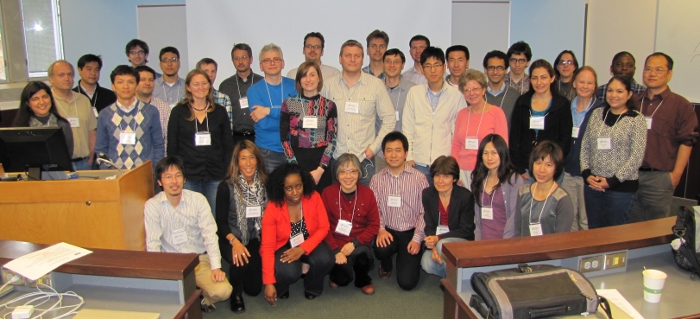| Description | Participants | Agenda | Products | Talks | Posters | Videos |
|---|
NIMBioS Investigative Workshop
Systems and Synthetic Microbiology

Topic: Systems and synthetic biology of microbial systems
Meeting dates: March 11-13, 2013
Location: NIMBioS at the University of Tennessee, Knoxville
Organizers:
Christopher Rao, Dept. of Chemical and Biomolecular Engineering, Univ. of Illinois
Lingchong You, Dept. of Biomedical Engineering and Institute for Genome Sciences and Policy, Duke Univ.
Objectives: The goal of this investigative workshop is to bring together researchers dealing with modeling and experimental analysis of microbial systems, using natural or engineered systems. Cutting across the diversity of the experimental systems, tools, and modeling approaches, is the common notion of using these systems as well defined models that allow highly controlled experimentation. Such analysis in turn has the potential to generate definitive and often times generally applicable insights into issues including network design principles, ecological interactions, and evolution of cooperative traits.
The central theme is to investigate the use of well defined microbial systems, natural and synthetic, to address fundamental questions in evolution, ecology, and design issues of cellular networks.
This workshop will bring together leading researchers in the fields of systems and synthetic microbiology. Our specific goal is to create a dialogue where these researchers can explore their shared insights and the theoretical approaches used to obtain them. Building from research presentations and discussions, we will examine several specific questions, including:
- Are there universal principles that govern the organization of microorganisms beyond chemistry and physics? This includes the organization of both intracellular networks and networks consisting of interacting microbial populations.
- How does evolution shape network organizations? For example, how does evolution shape the design of certain cellular networks?
- What can we say about collective behavior and "intelligence" in microbial populations?
- What inspirations can we draw from natural networks (intracellular, intercellular, and interpopulations) when creating synthetic networks at various levels?
- To what extent can we apply the insights learned from these model systems, particularly engineered systems, to the understanding of biological questions in broader contexts? This applies both to the understanding of basic biological questions and to the development of tools or strategies for applications in biotechnology and medicine.
Playlist of online presentations
![]()
Presentation abstracts (printable PDF)
Poster abstracts (printable PDF)
Evaluation report (PDF)
Products
Publications
Karpinets TV, Park BH, Syed MH, Klotz MG, Uberbacher EC. 2014. Metabolic environments and genomic features associated with pathogenic and mutualistic interactions between bacteria and plants. Molecular Plant-Microbe Interactions, 27(7): 664-677. [Online]
NIMBioS Investigative Workshops focus on broad topics or a set of related topics, summarizing/synthesizing the state of the art and identifying future directions. Workshops have up to 35 participants. Organizers and key invited researchers make up half the participants; the remaining participants are filled through open application from the scientific community. Open applicants selected to attend are notified by NIMBioS within two weeks of the application deadline. Investigative Workshops have the potential for leading to one or more future Working Groups. Individuals with a strong interest in the topic, including post-docs and graduate students, are encouraged to apply. If needed, NIMBioS can provide support (travel, meals, lodging) for Workshop attendees, whether from a non-profit or for-profit organization.
A goal of NIMBioS is to enhance the cadre of researchers capable of interdisciplinary efforts across mathematics and biology. As part of this goal, NIMBioS is committed to promoting diversity in all its activities. Diversity is considered in all its aspects, social and scientific, including gender, ethnicity, scientific field, career stage, geography and type of home institution. Questions regarding diversity issues should be directed to diversity@nimbios.org. You can read more about our Diversity Plan on our NIMBioS Policies web page. The NIMBioS building is fully handicapped accessible.
NIMBioS
1122 Volunteer Blvd., Suite 106
University of Tennessee
Knoxville,
TN 37996-3410
PH: (865) 974-9334
FAX: (865) 974-9461
Contact NIMBioS


